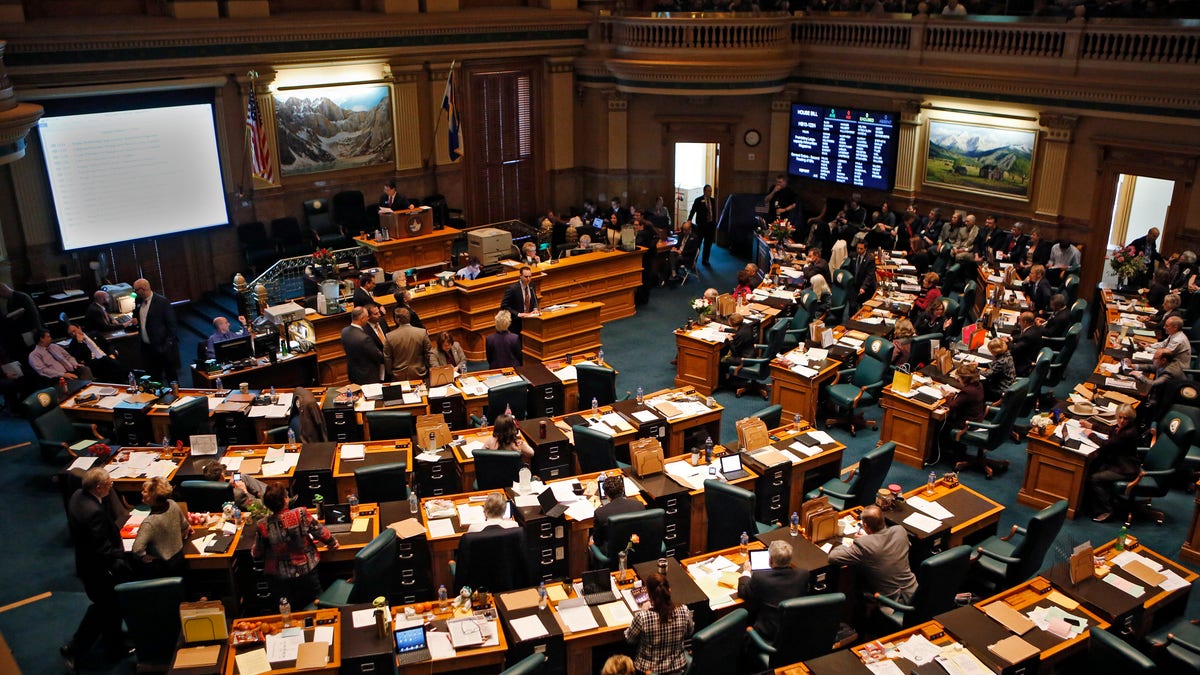
House members gather in their Chamber at the Capitol in Denver on Friday, Feb. 15, 2013, where a long emotional debate about guns and bills dealing with them is expected to last the entire day. Colorado lawmakers clashed Friday over setting limits on the size of ammunition magazines, a proposal in a package of Democratic bills responding to mass shootings at a suburban Denver movie theater and a Connecticut elementary school.(AP Photo/Ed Andrieski) (AP2013)
DENVER – A Colorado Senate committee will consider a gun control bill this week that would ban concealed carry on public college campuses, reversing a state Supreme Court ruling last year that forced colleges to accommodate students with concealed carry permits.
Chances are, however, few students would notice any change.
Boulder Democratic Rep. Claire Levy's bill comes as majority Democrats in both legislative chambers push gun control measures that include an assault weapons ban, universal background checks and limits on gun magazines. But campus police and some students say any change on concealed carry likely would have little impact.
"It's a difficult ban to enforce, because we have so many entrances and exits to this campus," said Ryan Huff, a spokesman for the University of Colorado Police Department.
Nevertheless, faculty have raised concerns about the potential presence of guns since the March court ruling, which said that only the legislature could create exceptions to the state's concealed carry law. Levy, whose district is home to the main campus of the University of Colorado, said it was those fears that prompted her to propose the bill.
"It wasn't so much a concerns that someone might use a weapon, but that not knowing if there was a weapon would be intimidating and inhibiting," Levy said.
Levy's concealed carry ban passed the House last month and is expected to go before the Senate State, Veterans, and Military Affairs Committee on Monday.
Concealed carry is available to adults 21 and older, only a portion of Colorado's college students. Without security checkpoints, enforcement is hard. And officials at several Colorado universities and colleges say they are unaware of any incidents involving a concealed carry permit holder before or after the Supreme Court ruling in March 2012.
In November, however, an employee at the University of Colorado dental school accidentally discharged her weapon inside an office at the school, slightly injuring herself and another person.
"People on our campuses report that it doesn't seem to have much of a day-to-day impact, or a visible day-to-day impact, on campus," said University of Colorado spokesman Ken McConnellogue. "It's not like (the campus police) will knock on doors and say, `Hey, you got a gun?"'
"There'd be no difference," said Zach Knight, a sophomore chemistry student at Metropolitan State University in Denver. "The whole point of concealed carry is not to know."
Knight, a 19-year-old gun owner, said he opposes the bill. He plans to get a concealed carry license when he's 21, and he wants to be able to carry his weapon on a campus that Metropolitan shares with CU-Denver and the Community College of Denver, where there's a steady flow of 45,000 students and others on and off campus.
"I'm not saying something's going to happen, but there are a lot of homeless guys around here, and what if something did?" Knight said.
Some faculty and administrators have been vocal about the desire to ban concealed weapons.
Metropolitan State's board of trustees and faculty senate voted to support Levy's bill. Faculty said they worry about a safe working environment, guns in the classroom, and the prospect of guns mixing with after-hours alcohol use.
"There is no need or purpose for guns," said Metropolitan State President Stephen Jordan. "The thought of that chills the academic environment that we'd like to have in the classroom."
Twenty-one states ban concealed weapons on public university campuses, and 23 states let colleges set their own policies, according to the National Council of State Legislatures. Arizona, Kentucky, Maryland and Colorado are considering banning guns from campus.
The Colorado School of Mines, the Colorado Community College system and Colorado State University support the bill.
It's a turnaround for Colorado State, which was one of few state universities to allow concealed carry before the Supreme Court ruling. CSU leaders now cite a 2008 position paper by the International Association of Campus Law Enforcement Administrators that advocates for gun-free campuses.
CSU spokesman Mike Hooker said he could not remember any incident related to the presence of concealed guns on campus, and supporters of concealed carry rights have often attributed Colorado State's low crime statistics to concealed carry.
From 2002 to 2003, the year concealed carry went into effect, crime rates fell at Colorado State. Proponents specifically pointed to a drop in sexual assaults. But CSU police chief Wendy Rich Goldschmidt said linking the two can be misleading and offered that she had never heard of an attempted sexual assault on campus stopped because someone had a gun.
Levy's bill has triggered debate at the University of Colorado, which was the focus of a lawsuit filed by Students for Concealed Carry on Campus, a national advocacy group, that ultimately led to the Supreme Court ruling.
Last month, CU's elected board of regents voted to table indefinitely a resolution expressing support of concealed carry. The decision upset faculty and others on both sides of the issue.
"I don't want to avoid the issue or remain silent while the events unfold that are affecting the university and its campus," said Sue Sharkey, a Republican regent who backed the resolution.
Levy said she originally planned a bill to let each campus adopt its own policy. She said she later proposed a statewide ban because she didn't want the issue to become even more polarizing than it is and detract from university boards' academic priorities.
"I'm pleased the (CU) board decided not to weigh in, because I think this would have had the effect I was concerned about," she said.




